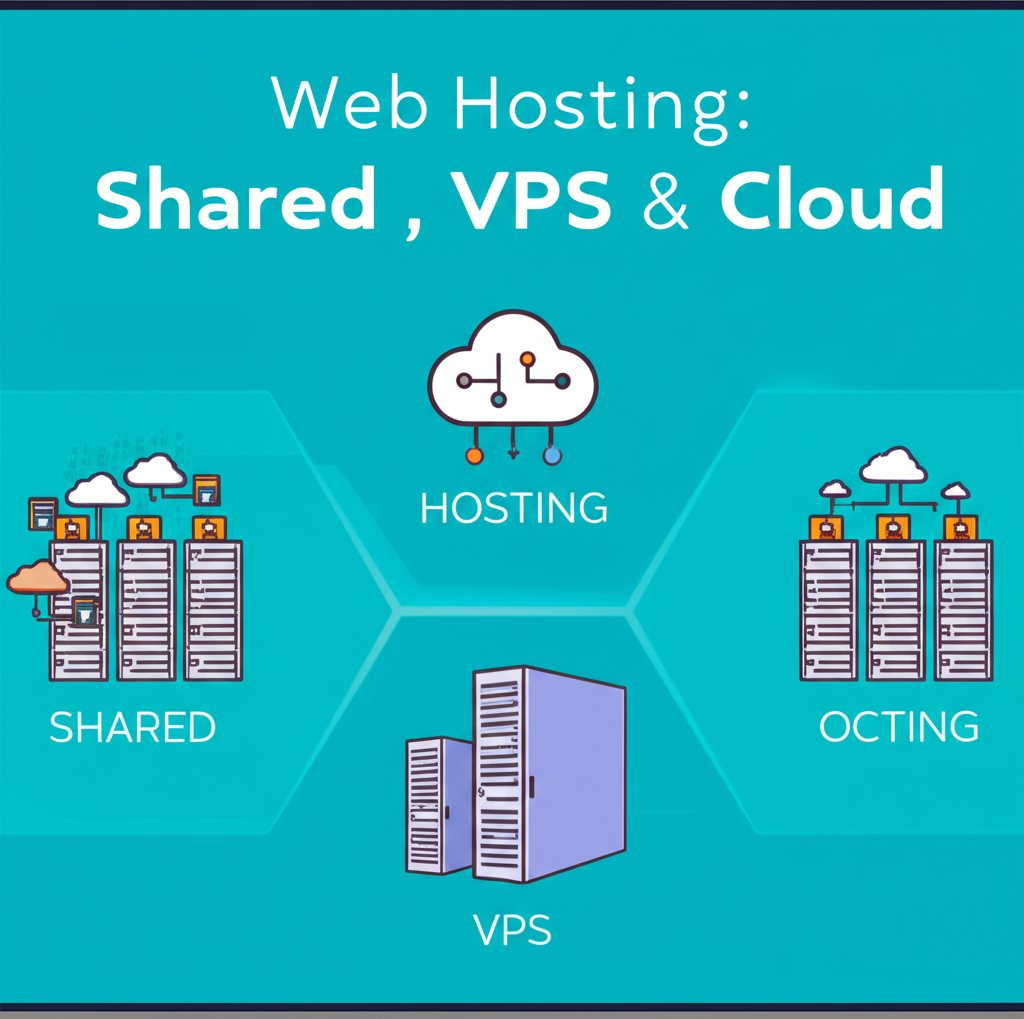- Understanding Your Web Hosting Options
- Shared Hosting: An Affordable Starting Point
- VPS Hosting: Enhanced Control and Performance
- Cloud Hosting: Ultimate Scalability and Reliability
- Choosing the Right Web Hosting: Key Considerations
- Traffic Volume: A Critical Factor in Web Hosting Decisions
- Budget: Balancing Cost and Performance
- Technical Expertise: Managing Your Hosting Environment
- Security Requirements: Protecting Your Online Assets
- Web Hosting: Making the Right Choice for Your Needs
Web Hosting: Your Best Guide to Shared, VPS, and Cloud Solutions
Web hosting is the foundation of any online presence. Whether you’re launching a personal blog, a small business website, or a large e-commerce platform, choosing the right hosting solution is crucial for success. This comprehensive guide will delve into the nuances of shared, VPS, and cloud hosting, empowering you to make an informed decision that aligns perfectly with your needs and budget.
Understanding Your Web Hosting Options
Navigating the world of web hosting can feel overwhelming with the sheer number of options available. Breaking down the core types—shared, VPS, and cloud—simplifies the process significantly. Let’s explore each in detail:
Shared Hosting: An Affordable Starting Point
Shared hosting is the entry-level option, ideal for beginners and websites with low traffic. Imagine an apartment building: you share resources like electricity and plumbing with other tenants. Similarly, in shared hosting, your website shares server resources (CPU, RAM, storage) with multiple other websites.
Pros:
Cost-effective: Shared hosting is the most budget-friendly option.
Easy to manage: Most providers handle server maintenance and updates.
Beginner-friendly: Requires minimal technical expertise.
Cons:
Limited resources: Performance can be affected by other websites on the same server.
Security vulnerabilities: A security breach on one website can potentially impact others.
Less control: Limited customization options and access to server configurations.
VPS Hosting: Enhanced Control and Performance
VPS (Virtual Private Server) hosting offers a step up from shared hosting. Think of it as owning a condo within a larger building. You still share the building, but you have your own dedicated space and more control over it. With VPS hosting, your website resides on a virtual server that shares physical server resources with other virtual servers, but each virtual server is isolated and operates independently.
Pros:
Improved performance: Dedicated resources ensure better website speed and stability.
Enhanced security: Isolation from other virtual servers minimizes security risks.
Greater control: Root access allows for customization and installation of specific software.
Scalability: Resources can be easily scaled up or down as needed.
Cons:
Higher cost: More expensive than shared hosting.
Requires technical knowledge: Managing a VPS server requires some technical expertise.
Cloud Hosting: Ultimate Scalability and Reliability
Cloud hosting represents the pinnacle of web hosting solutions. Imagine a network of interconnected servers working together to host your website. This distributed architecture offers unparalleled scalability and reliability. Cloud hosting leverages the power of multiple servers, dynamically allocating resources as needed.
Pros:
Unmatched scalability: Resources can be scaled up or down instantly to handle traffic fluctuations.
High availability: Redundancy across multiple servers ensures minimal downtime.
Pay-as-you-go pricing: You only pay for the resources you consume.
Enhanced security: Robust security measures protect against data loss and breaches.
Cons:
Cost can be complex: Pricing models can be intricate and challenging to predict.
Requires technical expertise: Managing cloud infrastructure can be complex.
Choosing the Right Web Hosting: Key Considerations
Selecting the right web hosting solution requires careful consideration of several factors:
Traffic Volume: A Critical Factor in Web Hosting Decisions
Anticipated website traffic plays a significant role in determining the appropriate hosting type. Shared hosting is suitable for low-traffic websites, while VPS or cloud hosting is necessary for websites expecting high traffic volumes.
Budget: Balancing Cost and Performance
Your budget will naturally influence your hosting choices. Shared hosting is the most economical, while cloud hosting can be more expensive depending on your resource utilization. VPS hosting offers a middle ground, providing better performance than shared hosting at a moderate cost.
Technical Expertise: Managing Your Hosting Environment
Your level of technical expertise will influence your ability to manage different hosting types. Shared hosting is the easiest to manage, while VPS and cloud hosting require more technical knowledge.
Security Requirements: Protecting Your Online Assets
The security of your website is paramount. Consider the level of security offered by each hosting type and choose one that aligns with your specific requirements. Cloud hosting often provides robust security features, while shared hosting can be more vulnerable.
Web Hosting: Making the Right Choice for Your Needs
Choosing the right web hosting solution is a crucial step in building a successful online presence. By understanding the different types of hosting available—shared, VPS, and cloud—and carefully considering factors such as traffic volume, budget, technical expertise, and security requirements, you can make an informed decision that sets your website up for success. Remember to thoroughly research different hosting providers, compare their offerings, and choose a provider that aligns with your specific needs and long-term goals.











Leave a Reply